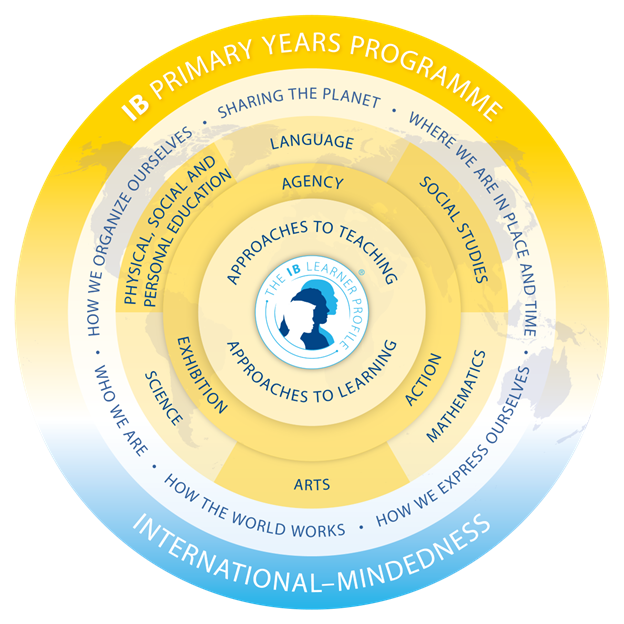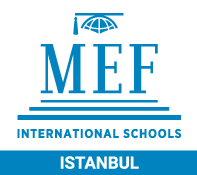MEF International School is authorised by the International Baccalaureate (IB) to offer Primary Years Programme (PYP). This programme is offered in many quality schools worldwide. It offers high quality education, enabling students to become lifelong learners and global citizens. It draws on international educational research to provide a framework of what the students need to learn and how they learn. In common with all IB programmes, the focus is on personal and academic achievement, challenging students to excel in their studies and in their personal development. Some of the information below has been sourced from the International Baccalaureate publications.

PRIMARY YEARS PROGRAMME
The IB Primary Years Programme (PYP) for children aged 3 – 12 nurtures and develops young students as caring, active participants in a lifelong journey of learning.
The PYP offers an inquiry-based, transdisciplinary curriculum framework that builds conceptual understanding. It is a student-centered approach to education for children aged 3-12. It reflects the best of educational research, thought leadership and experience derived from IB World Schools.
The PYP has evolved to become a world leader in future-focused education. The PYP is an example of best educational practice globally, responding to the challenges and opportunities facing young students in our rapidly changing world.
THE PYP CURRICULUM FRAMEWORK
The PYP curriculum framework begins with the premise that students are agents of their own learning and partners in the learning process. It prioritizes people and their relationships to build a strong learning community.
PYP students use their initiative to take responsibility and ownership of their learning. By learning through inquiry and reflecting on their own learning, PYP students develop knowledge, conceptual understandings, skills and the attributes of the IB Learner profile to make a difference in their own lives, their communities, and beyond.
IB LEARNER PROFILE – WHAT KIND OF INDIVIDUALS DO WE AIM OUR STUDENTS TO BECOME?
In all IB programmes learners strive to become individuals demonstrating the following attributes of the learner profile: inquirers, knowledgeable, thinkers, communicators, principled, open minded, caring, risk takers, balanced and reflective.
The learner profile is central to the PYP definition of what it means to be internationally minded.
LEARNING AND TEACHING IN THE PYP
In the PYP a balance is sought between acquisition of essential knowledge and skills, development of conceptual understanding and taking of responsible action.
In our programme, our students will:
- inquire and try to acquire knowledge and values that are personally, locally and globally significant.
- get a deeper understanding of the concepts.
- develop a range of life skills.
- be given chances to take responsibility and participate in social service.
Approaches to teaching: (What are the learning & teaching approaches that the programme is grounded on?)
- Based on Inquiry
Learning is driven by students’ questions and interests. Teachers act as facilitators who guide students through an active process of exploring and developing understanding.
- Focused on Conceptual Understanding
Teaching moves beyond the memorization of facts. It emphasizes deep understanding of concepts that are transferable across subjects and contexts.
- Developed in Local and Global Contexts
Learning is relevant and meaningful. Teachers help students connect their learning to real-life situations in both local and global communities.
- Focused on Effective Teamwork and Collaboration
Collaboration is embedded at all levels—among students, teachers, and the wider school community. Teaching encourages shared responsibility and collective problem-solving.
- Designed to Remove Barriers to Learning
Inclusive practices are central. Teaching is differentiated and accessible to ensure all students can participate, engage, and succeed.
- Informed by Assessment
Assessment is ongoing and integral to the learning process. Teachers use assessment data to inform and adjust teaching, provide feedback, and support student progress.
 Learner agency is strongly encouraged in the PYP. Students demonstrate agency when they take responsibility for their learning and actively collaborate with teachers and peers throughout all phases of the learning process. When students’ have agency, the relationship between the teacher and students becomes a partnership.
Learner agency is strongly encouraged in the PYP. Students demonstrate agency when they take responsibility for their learning and actively collaborate with teachers and peers throughout all phases of the learning process. When students’ have agency, the relationship between the teacher and students becomes a partnership.
WHAT DO OUR STUDENTS LEARN AND DEVELOP IN PYP?
Knowledge: (What do we want our students to know?)
Our aim is to make students inquire into interesting, challenging, relevant and significant topics. Students inquire into, and learn about globally significant issues in the context of units of inquiry, each of which addresses a central idea relevant to one of the following transdisciplinary themes:
Who We Are: An inquiry into identity as individuals and as part of a collective through:
- physical, emotional, social and spiritual health and well-being
- relationships and belonging
- learning and growing
Where We Are In Place And Time: An inquiry into histories and orientation in place, space and time through:
- periods, events and artefacts
- communities, heritage, culture and environment
- natural and human drivers of movement, adaptation, and transformation
How We Express Ourselves: An inquiry into the diversity of voice, perspectives, and expression through:
- inspiration, imagination, creativity
- personal, social and cultural modes and practices of communication
- intentions, perceptions, interpretations and responses
How The World Works: An inquiry into understandings of the world and phenomena through:
- patterns, cycles, systems
- diverse practices, methods and tools
- discovery, design, innovation: possibilities and impacts
How We Organize Ourselves: An inquiry into systems, structures and networks through:
- interactions within and between social and ecological systems
- approaches to livelihoods and trade practices: intended and unintended consequences
- representation, collaboration and decision-making
Sharing the Planet: An inquiry into the interdependence of human and natural worlds through:
- rights, responsibilities and dignity of all
- pathways to just, peaceful and reimagined futures
- nature, complexity, coexistence and wisdom
The Transdisciplinary Units of Inquiry
Each class engages in units of inquiry that guide learning throughout the year. In our Early Childhood Centre, students explore four units of inquiry, allowing time for extended investigations and emerging inquiries based on children’s own interests within a play-based environment. From Grade 1 to Grade 5, students engage in six units of inquiry, providing a broad and balanced exploration across transdisciplinary themes.
The Subject Areas
Students study six subject areas. These subject areas are:
- Language
- Social Studies
- Mathematics
- The Arts
- Science
- Personal, Social and Physical Education
Concepts: (What do we want our students to understand?)
Within each transdisciplinary theme, we develop a unit of inquiry with central ideas and lines of inquiry. Creating units of inquiry using concepts enables learners to develop conceptual understanding across, between and beyond the transdisciplinary themes.
The PYP identifies seven specified concepts that facilitate planning for a conceptual approach
to transdisciplinary and subject-specific learning. These concepts are:
- Form– What is it like?
- Function – How does it work?
- Causation – Why is it like it is?
- Change– How does it change?
- Connection – How is it connected to other things?
- Perspective – What are the points of view?
- Responsibility– What is our responsibility?
Alongside the specified concepts, additional concepts are explored within and outside of units of inquiry.
Together, these concepts drive the inquiries that are situated at the heart of the PYP curriculum.
Approaches to Learning (ATL Skills): (What do we want our students to be able to do?)
Within their learning throughout the programme, students acquire and apply a set of skills: social skills, communication skills, thinking skills, research skills and self-management skills. These skills are valuable, not only in the units of inquiry, but also for any teaching and learning that goes on within the classroom, and in life outside the school.
Action: (How do we want our students to act as a result of their learning?)
Action, the core of student agency, is integral to the Primary Years Programme (PYP) learning process and to the programme’s overarching outcome of international-mindedness. Through taking individual and collective action, students come to understand the responsibilities associated with being internationally minded and to appreciate the benefits of working with others for a shared purpose. When students see tangible actions that they can choose to take to make a difference, they see themselves as competent,capable and active agents of change. Students taking action in response to their inquiries lays a strong foundation for community service.
HOW DO WE KNOW THEY HAVE LEARNED? (ASSESSMENT)
Assessment is central to the Primary Years Programme (PYP) goal of thoughtfully and effectively supporting students through the acquisition of subject-specific knowledge and skills, the understanding of concepts and the development of approaches to learning.
The purpose of assessment is to inform learning and teaching. It involves the gathering and analysis of information about student learning to inform teaching practice. It identifies what students know, understand and can do at different stages in the learning process.
PYP assessment practices are ongoing, embedded in the learning process, and aim to support and enhance student learning. These practices involve continuously monitoring student progress, documenting learning through various tools and strategies, reporting to share insights with students and parents, and measuring learning against success criteria. Rather than being a one-time event, assessment in the PYP is an integral part of teaching and learning that informs next steps and empowers students to take ownership of their progress.
10 REASONS WHY THE IB PRIMARY YEARS PROGRAMME (PYP) IS IDEAL FOR STUDENTS TO BECOME ACTIVE, LIFELONG LEARNERS
- The PYP fosters natural curiosity and learning in a creative, supportive and collaborative environment.
- PYP students create meaning for themselves and build understanding through exploring real-world issues.
- PYP students create meaning for themselves and build understanding through exploring real-world issues.
- PYP students work collaboratively with teachers and other students to plan, present and assess their own learning.
- Collaboration and understanding of their own and other cultures are an important focus of the PYP — students learn how to be respectful and open-minded.
- PYP students use critical and creative thinking to develop knowledge, understanding and skills within and across subject areas.
- PYP students believe they are able to grow and succeed. They make appropriate choices and take responsibility for their actions.
- PYP students believe they are able to grow and succeed. They make appropriate choices and take responsibility for their actions.
- Together they celebrate their common humanity and the belief that education can help to build a better and more peaceful world.
- Students can express ideas and opinions, and they can propose solutions that make a difference in their lives and the lives of others.
Resources:
-
- Primary Years Programme The Learner – International Baccalaureate Organization; 2018
- Primary Years Programme Learning and Teaching – International Baccalaureate Organization; 2018
- https://www.ibo.org/programmes/primary-years-programme/
- https://www.ibo.org/globalassets/new-structure/digital-toolkit/pdfs/pyp-10-reasons-poster-en.pdf



